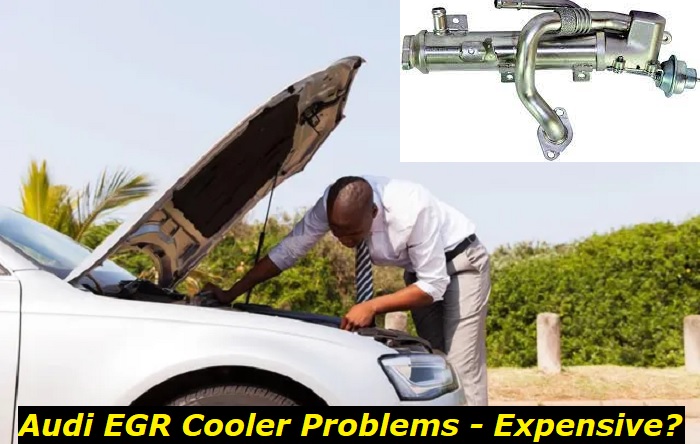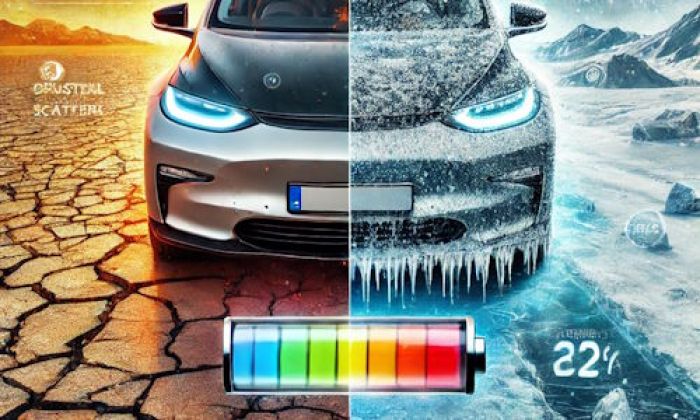Audi is one of the most trusted car brands in the auto world. The company is renowned for making reliable cars across the spectrum. For the car to run smoothly and deliver maximum power, all components must work at their optimal capacity.
Cooling equipment problems highlights
- Level of urgency:medium
- Commonreasons:low-quality antifreeze, age, mileage, damage
- DIY diagnostics:very complicated
- DIY repair:impossible
- Price of repair:$350 - $850
- Time for repair:3 - 10 hours
- If ignored:engine overheating, bad coolant leaks, equipment damage

What is an EGR Cooler?
The Exhaust Gas Recirculation valve, or the EGR valve as it is commonly known, is an engine part designed to monitor a vehicle's exhaust system. All modern Audi cars, especially diesel cars, come with an EGR cooler. It ensures harmful exhaust gases such as nitrous oxide are not released into the environment.
There are stringent emission regulations in place, and the VW group works hard to adhere to them. By installing the EGR cooler, the carmakers are not only ensuring the cars are safe for use but are also adhering to the law. To effectively reduce the harmful emissions of your car, the EGR cooler reduces the adiabatic flame temperature.
The EGR cooler's other role is ensuring that gas is burned wholly and efficiently. It ensures that the gas does not end up detonating inside the engine but rather is burned in the proper place. Gas detonating in the engine can make the engine knock over time.
How the EGR Cooler works
The EGR system redirects a small amount of exhaust gas back into the engine. This is done to prevent this gas from just being sent to the atmosphere. The valve is the system's main component that regulates the gases entering the intake manifold from the exhaust manifold. Ideally, the EGR system should improve the ecology features of the vehicle, and this is its only task.
The EGR cooler has a meshed interior, just like a radiator. Because the air coming in the cooler is very hot, it is cooled in another section where coolant flows to cool the hot air. Over time, there is coolant sediment build-up in the cooler. This causes the meshed interior of the system to block and the fragile steel of the cooler raptures, which then leads to coolant leaking into the engine.
The EGR system works at optimal levels when the car is cruising. Whenever the EGR flow falls short in your Audi, the Check Engine Light will come on. Let us now look into the EGR problems that Audi cars have.
The Audi EGR Cooler Problems
The EGR cooler in your car plays a vital role in running the engine and reducing gaseous emissions. If it malfunctions, the car's integrity becomes compromised, and other parts can get damaged too. You may fail to notice if your car's EGR has a problem, but here are the key symptoms to look out for:
- The Check Engine Light - The most common indicator for an EGR problem is the illumination of the CEL. Though this light can light up for various engine issues, your car's computer is designed to detect if the EGR cooler is working properly. That's why you should not ignore the check engine warning light.
- White smoke from the exhaust - If you notice white smoke coming from the exhaust, it is likely the EGR cooler has a problem. The white smoke or steam might be the EGR cooler has an internal leak, and the car's coolant is entering the EGR system. The coolant is then boiled inside the combustion chamber and leaves the exhaust pipe as white steam or white smoke. In the long run, the evaporating coolant will lead to engine overheating.
- Declining the level of coolant - Dropping coolant levels is not good for your engine as this will make the engine overheat. If the coolant level keeps falling and you can't see any leakage, then the EGR system will likely be the issue. This is especially the case if you notice white smoke coming from the exhaust.
- Rough idling - Rough idling is another common symptom of an EGR cooler problem. Rough idling means the EGR valve is stuck in the open position and unable to close. The car can also be dragging and lack power. Of course, other reasons can cause rough idling, too.
- The EGR valve is clean - Though this might seem odd, the EGR valve in your car should be sooty. This is because exhaust gases pass through it, and no liquid passes there. When the EGR cooler leaks, the coolant will flow through the valve, cleaning all the soot. This will make the valve appear clean.
Why do EGR coolers fail?
An EGR system can fail like any other engine part or component. Mostly, the reason for failing is beyond your control; you will need to replace it in many cases your mechanic diagnoses an EGR system problem. Here are the reasons for EGR cooler failure:
- Thermal stress - The repeated cycles of extreme temperatures can cause warping or cracking in the EGR cooler. Temperatures inside the cooler fluctuate from lows of 200 °C to highs of 800 °C. When these fluctuations happen over a long period, some damage is bound to happen to the system.
- Coolant blockage - The coolant passageways can sometimes become blocked, leading to an inefficient EGR system. While this can be hard to see, you should notice an increase in fuel consumption and engine overheating.
- Corrosion - The build-up of particulates and acidic condensation when temperatures drop can contribute to EGR coolers corroding.
One of the common issues reported by Audi car owners in various car forums is the failure of the EGR system.
Is it dangerous to drive with a faulty EGR cooler?
To know whether driving a car with a faulty EGR system is advisable, you need to know some things first. When the coolant mixes with the engine oil, the oil becomes degraded, which in turn means engine parts wear out much faster. Some Audi owners who have encountered coolant leakage say they take their cars for service twice as many times.
A few drops of coolant leaking into the EGR cooler will be quickly sucked into the engine cylinders. This then causes white smoke from the tailpipe and big considerations of the driver. Also, over time, this may cause engine overheating because of the insufficient coolant level.
A small amount of coolant in the engine won't cause an immediate problem. But after continued car usage in this condition, serious issues will start to appear though.
There are instances when a more considerable amount of coolant can enter through a failed EGR cooler. This will cause hydro locking of the engine, and the engine will knock.
There are other times when the hydro locking will be partial. This can lead to connecting rods bending slightly, making the pistons not run smoothly in the cylinders hence scraping the walls of the cylinders. The engine may continue running, albeit poorly, and many metal particles will be deposited in the oil.
How to fix the EGR cooler issue?
There is no particular way you can use or drive your car to prevent the EGR cooler or system from developing issues. Some Audi owners in the online forums report having EGR cooler problems when their cars' odometer reaches 30,000 miles. Some say when they get to 60,000 miles. The good thing is that the Audi warranty covers this part, at least until it's voided.
Most Audi cars have theirs at the back of the engine. This means accessing the EGR system will require an expert. Though you might find a mechanic who will advise you to do some repairs and continue driving, this is not recommended by a majority of dealers and mechanics.
An Audi dealer will plug your car into the diagnostics machine, which will most likely give a P0401 if it is an EGR system problem.
Many Audi owners know they are going to kiss goodbye to a large sum of money because the labor involved in removing an EGR cooler is quite extensive (around 5 hours). It sometimes makes more sense to buy a new EGR rather than repair the faulty one. This is because the high labor cost wouldn't warrant just a repair. In most garages, replacing a new Audi EGR cooler will set you back anything between $800 and $1,200.
About the authors
The CarAraC research team is composed of seasoned auto mechanics and automotive industry professionals, including individuals with advanced degrees and certifications in their field. Our team members boast prestigious credentials, reflecting their extensive knowledge and skills. These qualifications include: IMI: Institute of the Motor Industry, ASE-Certified Master Automobile Technicians; Coventry University, Graduate of MA in Automotive Journalism; Politecnico di Torino, Italy, MS Automotive Engineering; Ss. Cyril and Methodius University in Skopje, Mechanical University in Skopje; TOC Automotive College; DHA Suffa University, Department of Mechanical Engineering






Add comment